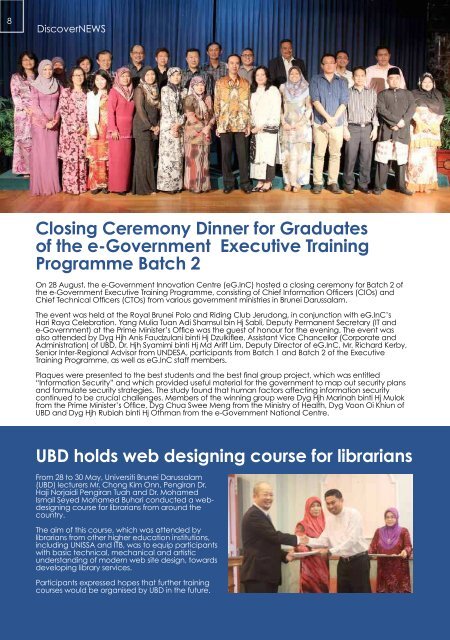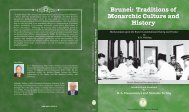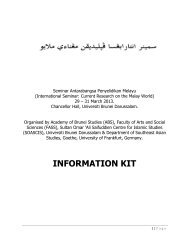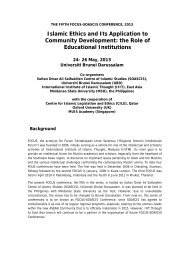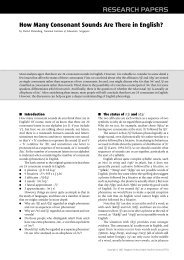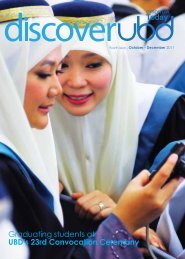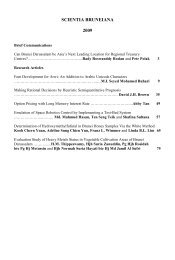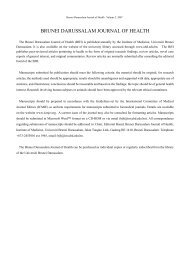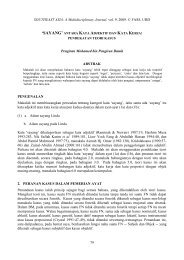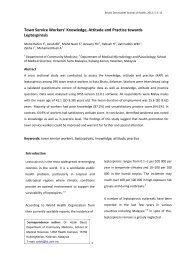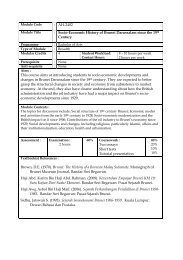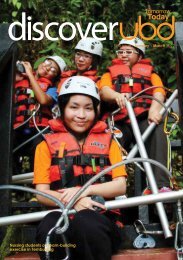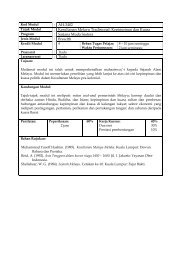Seventh issue . July - September 2012 - Universiti Brunei Darussalam
Seventh issue . July - September 2012 - Universiti Brunei Darussalam
Seventh issue . July - September 2012 - Universiti Brunei Darussalam
You also want an ePaper? Increase the reach of your titles
YUMPU automatically turns print PDFs into web optimized ePapers that Google loves.
8DiscoverNEWSDiscoverNEWS9Princeton professor gives talk on impactsand economics of oil palm logging andagricultureProfessor David S. Wilcove, Professor of Public Affairs and Ecology and Evolutionary Biology at theWoodrow Wilson School, Princeton University, was in <strong>Brunei</strong> <strong>Darussalam</strong> from 25 June to 2 <strong>July</strong> <strong>2012</strong> on aresearch visit.Professor Wilcove, a renowed conservation ecologist who has worked with some of the foremost expertsin the field, including the late Professor Navjot Sodhi, was here as part of an ongoing collaborationbetween Princeton University and UBD on a research project titled “Ecology and conservation ofblackwater fishes in intact and disturbed peat swamp forests in Southeast Asia.” His local collaboratorsat UBD are Dr. Rahayu Sukri and AP Dr. Hajah Zohrah Haji Sulaiman of the Biology Programme, Faculty ofScience (FOS).Closing Ceremony Dinner for Graduatesof the e-Government Executive TrainingProgramme Batch 2During his visit, Professor Wilcove gave a FOS-hosted public lecture on “Understanding the biodiversityimpacts and economics of logging and oil palm agriculture in Sabah.” The lecture focused on workconducted by the ecologist and his research team in Sabah, where they found that selective loggingcauses relatively moderate losses of biodiversity, whereas conversion of forests to oil palm results incatastrophic losses. He highlighted that the conservation of selectively logged forests may offer a costeffectivemeans to enlarge existing reserves or connect them with corridors.To complete his first visit to <strong>Brunei</strong>, Professor Wilcove made several field visits to forest sites in the Belaitdistrict, to experience firsthand pristine lowland mixed dipterocarp, heath and peat swamp forests.On 28 August, the e-Government Innovation Centre (eG.InC) hosted a closing ceremony for Batch 2 ofthe e-Government Executive Training Programme, consisting of Chief Information Officers (CIOs) andChief Technical Officers (CTOs) from various government ministries in <strong>Brunei</strong> <strong>Darussalam</strong>.The event was held at the Royal <strong>Brunei</strong> Polo and Riding Club Jerudong, in conjunction with eG.InC’sHari Raya Celebration. Yang Mulia Tuan Adi Shamsul bin Hj Sabli, Deputy Permanent Secretary (IT ande-Government) at the Prime Minister’s Office was the guest of honour for the evening. The event wasalso attended by Dyg Hjh Anis Faudzulani binti Hj Dzulkiflee, Assistant Vice Chancellor (Corporate andAdministration) of UBD, Dr. Hjh Syamimi binti Hj Md Ariff Lim, Deputy Director of eG.InC, Mr. Richard Kerby,Senior Inter-Regional Advisor from UNDESA, participants from Batch 1 and Batch 2 of the ExecutiveTraining Programme, as well as eG.InC staff members.Plaques were presented to the best students and the best final group project, which was entitled“Information Security” and which provided useful material for the government to map out security plansand formulate security strategies. The study found that human factors affecting information securitycontinued to be crucial challenges. Members of the winning group were Dyg Hjh Marinah binti Hj Mulokfrom the Prime Minister’s Office, Dyg Chua Swee Meng from the Ministry of Health, Dyg Voon Oi Khiun ofUBD and Dyg Hjh Rubiah binti Hj Othman from the e-Government National Centre.UK’s premier climate scientist Dr Vicky Popegives lecture at UBDOn 1 October, in association with <strong>Universiti</strong> <strong>Brunei</strong> <strong>Darussalam</strong> (UBD) and the British High Commission,one of the UK’s premier climate scientists, Dr. Vicky Pope, gave a lecture at the Institute of Leadership,Innovation and Advancement (ILIA) entitled “Latest developments in climate modelling and how it isused in decision making.”Introducing the lecture was British High Commissioner Rob Fenn who remarked, “I see Dr Pope’s visit– which is the latest contribution to scientific exchanges between the UK and <strong>Brunei</strong> – as part of astrengthening network of research relationships, and as evidence that British and <strong>Brunei</strong>an researchers arenatural partners. It also goes to show that <strong>Brunei</strong>’s commitment to serious science (which includes the topflight facilities here at UBD) benefit from the Sultanate’s established reputation as an energy provider andas “Custodian of the Rainforest.” Dr Pope’s work involves modelling an “Earth system” of which <strong>Brunei</strong>’speat swamp forests and other carbon sinks are an iconic part. <strong>Brunei</strong>’s extraordinary biodiversity is abellwether for climate change.”UBD holds web designing course for librariansFrom 28 to 30 May, <strong>Universiti</strong> <strong>Brunei</strong> <strong>Darussalam</strong>(UBD) lecturers Mr. Chong Kim Onn, Pengiran Dr.Haji Norjaidi Pengiran Tuah and Dr. MohamedIsmail Seyed Mohamed Buhari conducted a webdesigningcourse for librarians from around thecountry.The aim of this course, which was attended bylibrarians from other higher education institutions,including UNISSA and ITB, was to equip participantswith basic technical, mechanical and artisticunderstanding of modern web site design, towardsdeveloping library services.Participants expressed hopes that further trainingcourses would be organised by UBD in the future.The High Commissioner also showed a home movie about a visit to UBD’s Faunal Survey at Sungai Ingei,calling it his “salute to science in <strong>Brunei</strong>”, and adding that “the knowledge economy is like a river. In<strong>Brunei</strong> it rises here, at UBD.”Dr. Pope has been working for the UK Meteorology Office (the UK’s National Weather Service) since the1980s and in 2002, she became a senior manager, responsible for various aspects of the climate researchprogramme for various government departments which focus on the provision of climate change adviceto underpin policy development. More recently, she led work to improve the communication of climatechange in light of its increasing importance in the public arena.Dr. Pope’s lecture concentrated on how models are used to underpin policies with regards to climatechange and demonstrated how model results combined with analysis of observations have been used toprovide evidence for developing policies and planning.Those attending the lecture included UBD academics and students, as well as representatives from<strong>Brunei</strong>’s main policy advisers and makers, including the Ministry of Industry and Primary Resources, the<strong>Brunei</strong> Economic Development Board and the Centre for Strategic and Policy Studies. Other stakeholdersin attendance were the <strong>Brunei</strong> Meteorological Service, the Climate Change Unit, the Department ofDrainage and Sewerage National Seismic Centre, the National Disaster Management Centre and severalsixth form students.Dr. Pope’s visit was funded by the UK ASEAN Knowledge Partnership Mobility Scheme, which isadministered by the UK’s network of diplomatic posts in Southeast Asia with the aim of promotingcollaboration between the UK and ASEAN countries.


